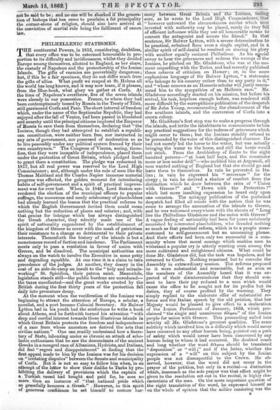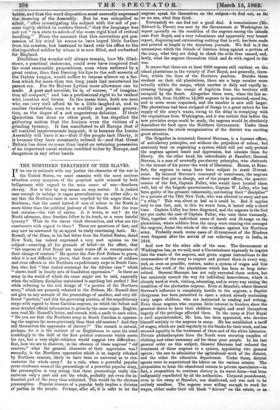PHILHELLENIC STATESMEN.
THE continental Powers, in 1815, considering, doubtless, that every office was to be esteemed honourable in pro- portion to its difficulty and invidiousness, whilst they divided Europe among themselves, allotted to England, as her share, the custody of Napoleon and the protectorship of the Ionian Islands. The gifts of enemies are proverbially dangerous ; but, if this be a fair specimen, they do not differ much from the gifts of allies. What profit we reaped at St. Helena all the world has long known, and it may now learn, if it pleases, from the Blue-book, what glory we gather at Corfu. At the time of Napoleon's overthrow, five of the seven islands were already in our possession. France, to whom they had been contemptuously tossed by Russia in the Treaty of Tilsit, still garrisoned Corfu and Paxo. The short interval of freedom which, under the name of the Septinsular Republic, they had enjoyed after the fall of Venice, had been passed in bloodshed and anarchy until the principal citizens implored the Emperor of Russia to save them from themselves, declaring that "the Ionians, thou0 they had attempted to establish a republi- can constitution, were neither born free, nor instructed in any arts of government, nor possessed of moderation so as to live peaceably under any political system framed by their own countrymen." The Congress of Vienna, seeing, there- fore, that they were incapable of independence, placed them under the protection of Great Britain, which pledged itself to grant them a constitution. The pledge was redeemed in 1817, but all real power was reserved to the Lord High Commissioner ; and, although under the rule of men like Sir Thomas Maitland and Sir Charles Napier immense material progress was effected, the golden moment for introducing habits of self-government and a spirit of practical improve- ment was for ever lost. When, in 1848, Lord Seaton sur- rendered the election of the municipal officers to popular suffrage, the numerous and needy aristocracy of pla,ceholders had already learned the lesson that the practical reforms to which the English Government invited them could mean nothing but the reduction of places and salaries ; and, with that genius for 'intrigue which has always distinguished the Greek character, they adroitly made use of the spirit of nationality engendered by the establishment of the kingdom of Greece to cover with the mask of patriotism their resistance to a change so detrimental to their private interests. Thenceforth the history of the islands is but a monotonous record of faction and insolence. The Parliament meets only to pass a resolution in favour of union with Greece, and be dissolved. The municipal authorities are always on the watch to involve the Executive in some petty and degrading squabble. At one time it is a claim to take precedence of the judges. At another, they descry in the coat of an aide-de-camp an insult to the "holy and miracle- working" St. Spiridion, their patron saint. Meanwhile, legislation stands still—the public burdens are unreduced— the taxes uncollected—and the great works erected by the British during the first thirty years of the protection fall daily into premature decay. At the moment when the vociferation of the Ionians was beginning to attract the attention of Europe, a scholar, a novelist, and a poet became Colonial Secretary. Sir Bulwer Lytton had in his youth had the misfortune to write a book about Athens, and he forthwith turned his attention "with deep and cordial interest towards those illustrious islands in which Great Britain protects the freedom and independence of a race from whose ancestors are derived the arts that civilize nations." One can readily understand how a Secre- tary of State, labouring under so chronic an attack of scho- lastic enthusiasm that he saw the descendants of the ancient Greeks in a mongrel race of Albanians, Hydriots, and Italians, did feel "regret and disappointment" at finding that the first appeal made to him by the Ionians was for his decision on "irritating disputes" between the Senate and municipality of Corfu. But it is not so easy to follow him when, in an attempt of the latter to show their dislike to Turks by pro- hibiting the delivery of provisions which the captain of a Turkish vessel had bought and paid for, be sees no more than an instance of "that national pride which so gracefully becomes a Greek." However, in this spirit of generous confidence he set himself to restore liar- mony between Great Britain and the Icimans, feeling sure, as he wrote to the Lord High Commissioner, that "however untoward the circumstances amidst which. men invested with authority may be placed, rarely do they fail of efficient influence while they use all honourable means to convert the antagonist and secure the friend." In that sentence, Sir Bulwer Lytton, with a severe determination to be practical, refrained from even a single capital, and in a similar spirit of self-denial he resolved on sharing his glory with another equally eminent Philhellene. As his saecial envoy to hear the grievances and redress the wrongs oT the Ionians, he pitched on Mr. Gladstone, who was at the mo- ment coquetting with the Tories, and had recently published three octavos of criticism on Homer ; or, in the more euphonious language of Sir Bulwer Lytton, "a statesman who belongs to his country rather than to any party in it," and "whose renown as an Homeric scholar will justly recom- mend him to the sympathies of an Hellenic race." Mr. Gladstone accordingly started on his mission, but before his arrival, his task, hopeless enough before, was rendered still more difficult by the surreptitious publication of the despatch of Sir John Young, recommending the abandonment of the five southern islands, and the conversion of Corfu into a crown colony. Mr. Gladstone's first step was to make a progress through the islands, and invite the inhabitants to communicate to him any practical suggestions for the redress of grievances which might occur to them ; but the Ionians steadily refused to be persuaded by the voice of this distinguished charmer. He had not merely led the horse to the water, but was actually . bringing the water to the horse, and still the hone would not drink. From the Archbishop of Zante to the eight hundred persons—' at least half boys' and the remainder more or leas under drill"—who mobbed him at .A.rgostoli, all men wanted nothing of England but that she should go and leave them to themselves. In vain he perorated in Ita- lian; in vain he expressed his " reverence " for the clergy ; in vain he derived a shadow of comfort from the distinction which he drew between the cries of "Union with Greece I" and " Down with the Protection !" which last more insulting expression be heard only upon one occasion. The unhappy publication of the purloined despatch had filled all minds with the notion that he was come to arrange the annexation of the islands to Greece, and he was welcomed everywhere with the shouts of "Long live the Philhellene Gladstone and the union with Greece !'
A vague feeling of nationality had been for years sedulously nourished by interested placeholders, who dreaded nothing so much as that practical reform, which is to a people unac- customed to self-government but an unmeaning phrase. And their efforts had been only too successful in a com- munity where that moral courage which enables men to withstand a popular cry is utterly wanting even among the more cultivated and enlightened citizens. What could be done Mr. Gladstone did, but the task was hopeless, and he returned to Corfu. Nothing remained but to convoke the Assembly in extraordinary session. The reforms proposed to it were substantial and reasonable, but as soon as the members of the Assembly heard that it was ex- pected of their disinterestedness that they should con- sent to have their pay reduced to a sum which would cause the office to be sought not for its profits but its duties, they of course profited by the warning. They simply replied to the elaborate offer of substantial re- forms and the Italian speech by the old petition, that her Majesty would be 'pleased to give effect to a declaration of the Ionian Parliament of January, 1859, which pro- claimed "the single and unanimous !Awn" of the Ionian people for union with Greece. This proceeding called into activity all Mr. Gladstone's greatest qualities. The same subtlety which involved him in a difficulty which would never have occurred to any other human being, pointed out a path of safety which would never have been discovered by any human being to whom it had occurred. He doubted much and long whether the word Maffir should be translated "disposition" or "will ;" and if the latter, whether the expression of a "will" on this subject by the Ionian people was not disrespectful to the Crown. He ob- served, however, that the word did not occur in the prayer of the petition, but only in a recital—a distinction which, inasmuch as the sole prayer was that effect might be given to the resolution set out in the recital, is highly cha- racteristic of the man. On the more important question of the right translation of the word, he expressed himself as on the whole of opinion that the milder rendering was the
better, and that the word disposition most correctly expressed the meaning of the Assembly. But he was compelled to admit, "after investigating the subject with the aid of per- sons highly skilled in modern Greek," that the language was not yet "in a state to admit of the more rigid kind of critical handling." From the moment that this conviction got pos- session of his mind he seems to have hoped little further from his mission, but hastened to hand over his office to the distinguished soldier by whom it is now filled, and embarked for England.
Doubtless the wonder will always remain, how Mr. Glad- stone, a practical statesman, could ever have imagined that the most reasonable propositions, even when enforced by a great orator, then first framing his lips to the soft accents of the Italian tongue, would suffice to impose silence on a fac- tion which for more than ten long years had maintained its parrot cry. For Sir Bulwer Lytton more allowance can be made. A poet and novelist, he is, of course, "of imagina- tion all compact," and has a professional right to be ranked with lunatics and lovers. In the mean time, both are men who can very well afford to be a little laughed at, and to confess themselves, even to a worldly and prosaic genera- tion, as the dupes of a not ungenerous delusion. If their Quixotism has done no other good, it has dispelled the gathering notion that the Ionians were the victims of a grinding tyranny. It has manifested to all Europe that if all material improvements languish, it is because the Ionian Assembly will have it so—that if the people lack liberty, it is because they have constantly refused it—and that Great Britain has done no more than insist on retaining possession of an important naval station confided to her by Europe, and dangerous in any other hands.































 Previous page
Previous page